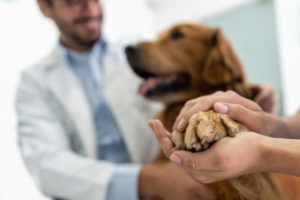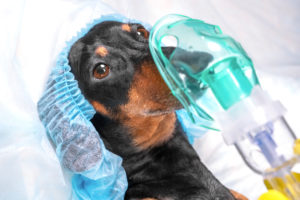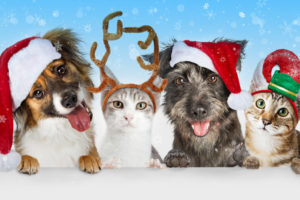A recent survey shows that 54% of our nation’s pets are overweight. Pet obesity is frequently in the news. You may have seen the recent story about Obie, the dachshund who weighs 77 pounds, which is twice the size of a normal dachshund. Or you may have read about Meow, the 40-pound cat who recently died from heart failure. Both cases involved owners who were over-feeding and feeding inappropriately fatty foods to their pets. Sadly, sometimes people think they are showing their pets love by feeding them all the tasty and fatty foods which we find tempting, but in fact, they’re reducing their pet’s lifespan and quality of life. In honor of National Pet Obesity Awareness Day, we are discussing the dangers of your pet being overweight and the measures you can take to ensure that your pet maintains a healthy weight.
When pets become overweight, several negative health effects can occur:
- Suppressed immune system
Breathing problems - Joint pain and damage
Skin disease - Increased risk of cancer
Diabetes - Thyroid dysfunction
Liver problems - Impaired kidney function & urinary problems
Increased risk of heart disease - Mobility issues/decreased ability to exercise
Increased susceptibility to heat stroke
There are several measures that pet owners can take to help their pet maintain a healthy weight:
- The most important step is feeding your pet with good quality food with appropriate nutrition. Dr. Richter suggests avoiding foods with highly processed ingredients. Stay as close to “whole foods” as possible.
- Give your pet adequate exercise with daily walks or playtime for indoor cats.
- Pay attention to the amount of food you feed your pet. What’s on the package may not be appropriate for your dog, since every animal is unique! Communicate any concerns about weight management to your veterinarian.
- Sometimes weight loss or weight gain can be a sign of illness. If your pet’s weight changes, consult with your veterinarian. Your veterinarian may want to examine your animal to make sure he or she doesn’t have a condition which requires treatment.
- Don’t forget to provide your dog or cat with fresh water as often as possible. Sometimes they want to eat treats, but what they need is fresh water.
- Lastly, try rewarding your dog or cat with love and affection, instead of always giving treats. Sometimes they are simply begging for attention rather than food!




